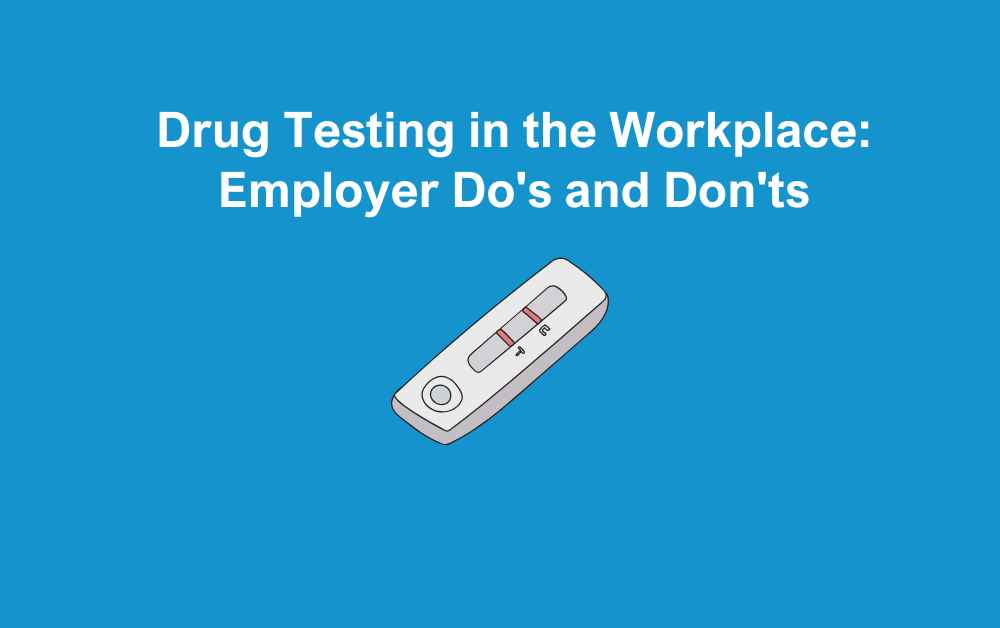Drug testing in the workplace can be an important tool for maintaining a safe, productive, and compliant working environment. However, we understand this can be a difficult process as an employer. Implementing an effective drug testing policy requires a careful approach to ensure compliance with employment laws, protect employee privacy, and follow best practices. In this blog, we explore legal considerations, and practical steps for introducing and managing drug testing in your workplace.
Jump to a Section:
- Can an Employee Refuse a Drug Test?
- What is the Law on Drug Testing in the Workplace?
- Protecting Employees in the Workplace
- Impact Assessment
- Drug and Alcohol Policy
- What to Do If an Employee Fails a Drug Test?
- Supporting Employees with Drug and Alcohol Problems
- How The HR Booth Can Help
- Contact Us
Can an Employee Refuse a Drug Test?
Employees cannot be forced to undergo a drugs test. However, if an employer has reasonable grounds for requesting a test—such as concerns about safety, suspect that an employee is under the influence of drugs/alcohol or workplace policy violations—and the employee refuses, this will be treated as the employee providing a non-negative drug test. This could lead to disciplinary action. The consequences will depend on the company’s drug and alcohol or health and safety policy and the nature of the job.
What is the Law on Drug Testing in the Workplace?
Employee’s cannot be forced into taking a drug or alcohol test, however, we would suggest that this is written into the contract of employment and/or be included in an Occupational health and safety policy or drug and alcohol policy. Employers should:
- Limit testing to relevant employees
- Conduct tests randomly
- Avoid targeting individuals unless justified by their job role
Protecting Employees in the Workplace
Employers must ensure the health, safety, and welfare of employees and others affected by their work, including managing risks from alcohol or drug impairment. Allowing an employee to work while under the influence or failing to act on workplace drug-related activities can lead to prosecution. Even off-duty substance misuse can impact workplace safety and performance.
Drug and alcohol risks are especially critical in safety-sensitive roles like driving or operating machinery. Drug testing in the workplace should be risk-based, justified by safety or performance concerns, and used only when it provides clear evidence, unless required by law.
Impact Assessment
When considering this type of testing, it’s important to weigh up the benefits against the consequences. This can be done through an impact assessment. This evaluates the potential effects on legal compliance, employee morale, and overall business operations. It helps employers balance safety and fairness to ensure the policy is effective and aligned with workplace culture.
Drug and Alcohol Policy
A well-structured drug and alcohol policy should clearly outline expectations, procedures, and support available for employees. Key elements to include are:
1. Purpose and Scope
Define the policy’s aim, such as ensuring workplace safety and employee wellbeing. Specify who it applies to, including employees, contractors, and visitors.
2. Rules on Drug and Alcohol Use
Clearly state the organisation’s stance on alcohol and drug use outlining the tolerance levels for testing, include prohibited substances, restrictions on consumption during work hours, and rules for work-related events.
3. Medication
Employees must inform the company of any prescribed medication that could affect their ability to work safely and follow any given instructions accordingly.
4. Testing Procedures
If testing is included, outline when and how it will be conducted, ensuring compliance with employment laws. This should cover:
- Circumstances for drug testing in the workplace (e.g., random, post-incident, or with reasonable suspicion)
- Employee consent requirements
- How results will be handled and confidentiality maintained
5. Support and Rehabilitation
Encourage employees to seek help by detailing available support, such as referrals to occupational health services or employee assistance programmes (EAPs). Explain how the company will assist employees struggling with substance misuse.
6. Disciplinary Procedures
Set out the consequences of policy breaches, including possible disciplinary action. Clearly differentiate between misconduct and cases where an employee may need medical support.
7. Responsibilities of Employees and Managers
Clarify what is expected from employees in adhering to the policy and the role of managers in enforcing it, supporting staff, and handling concerns appropriately.
8. Confidentiality and Data Protection
Ensure employees that all information related to drug and alcohol concerns, including test results, will be handled confidentially and in line with data protection laws.
By including these key elements, employers can create a fair, supportive, and legally compliant drug and alcohol policy that promotes workplace safety and wellbeing.
What to Do If an Employee Produces a Non-Negative Drug Test?
If an employee takes a workplace drug test and subsequently produces a result that highlights any prohibited substances, the test will be deemed to have produced a non-negative result. Employers must follow a clear and fair process in line with company policy and employment law. The first step is to confirm the accuracy of the drug testing in the workplace, an initial drug test may only highlight that there is a prohibited substance within the employee’s system and the first step would be to send the test to a lab for confirmation whilst ensuring that the chain of custody is not broken. At this stage, you should explore any potential mitigating circumstances, such as prescribed medication.
Once confirmed, the next course of action depends on company policy and the severity of the situation. Immediate suspension may be necessary to protect others. In other cases, a formal meeting should be held to discuss the results, outlining potential consequences, which may include disciplinary action, a warning, or support options.
Providing support, such as access to an employee assistance programme (EAP) or rehabilitation resources, can be beneficial, particularly if substance misuse is linked to personal issues. Employers should document all steps taken and ensure decisions are consistent, fair, and legally compliant. The goal after drug testing in the workplace should be to maintain workplace safety while also considering the employee’s wellbeing and any potential for rehabilitation.
Supporting Employees with Drug and Alcohol Problems
Alcohol and drug-related issues can develop over time for various reasons. Where possible, these should be treated like any other health concern, offering support to help the employee return to full duties. This may include:
- Referral to appropriate treatment providers, if needed.
- Providing employees with your company employee assistance programme.
- Time off for treatment, with absences recognised as sick leave.
- Duty adjustments or support as advised by a GP or specialist, where feasible.
In order to support employees with alcohol or drug-related problems to regain good health, you can suspend any possible disciplinary action for a certain period of time to allow the employee to regain health. You can also discontinue or restart a disciplinary process at any time as you see fit.
Even though your employee is seeking or undergoing treatment, this is not a defence to a breach of policy when attending work under the influence of alcohol, drugs, or substances.
How The HR Booth Can Help
At The HR Booth, we understand that drug testing in the workplace and implementing a drug and alcohol policy can be a complex process. Ensuring compliance with employment laws, maintaining a safe working environment, and supporting employees appropriately all require a balanced and well-structured approach. Our expert HR consultants are here to help you navigate these challenges effectively.
We provide support in the following areas:
- Policy Development – We assist in drafting and reviewing your drug and alcohol policy to ensure it aligns with employment law and best practices.
- Legal Compliance – Our team ensures your drug testing procedures comply with UK employment law, including employee consent, data protection, and disciplinary actions.
- Organise Drug and Alcohol Testing – Through our partners, we can arrange for drug and alcohol testing to be conducted by an occupational health professional.
- Training for Managers – We offer training to help your managers understand how to handle drug and alcohol issues sensitively and legally, including spotting signs of impairment and following proper procedures.
- Employee Support Programmes – We can help you establish an Employee Assistance Programme (EAP) to support employees dealing with substance misuse issues.
- Disciplinary and Dismissal Guidance – If an employee produces a non-negative test, we guide you through the appropriate disciplinary actions while ensuring fairness and compliance.
Contact Us
If you need expert HR advice on drug testing in the workplace, The HR Booth is here to support you. Whether you need assistance with policy creation, training, or handling a specific case, we can provide tailored guidance that suits your business needs.
Contact us today to discuss your requirements and ensure your workplace remains safe, productive, and legally compliant.







